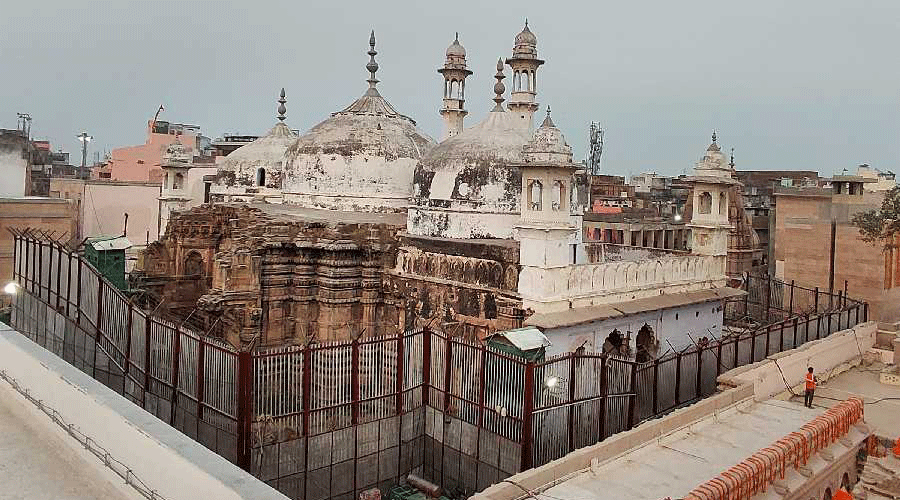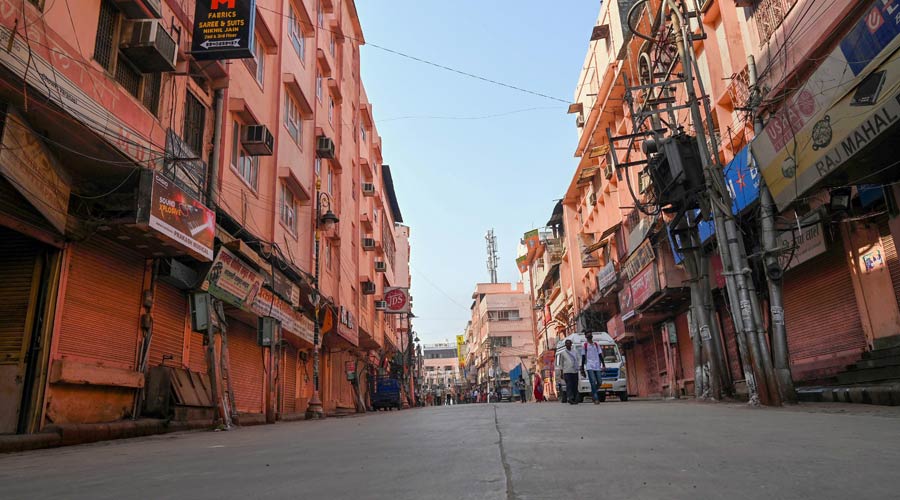A Varanasi court on Monday asked the Uttar Pradesh government to seal the area around a small pond on the premises of the Gyanvapi mosque, which adjoins the Kashi Vishwanath temple, after a Shivalinga was allegedly found in the water body.
A lawyer for the Hindu side in the case told reporters the purported discovery was evidence that Mughal emperor Aurangzeb had demolished the original Kashi Vishwanath temple to have the mosque built — a claim that underpins a Sangh parivar campaign for the mosque’s removal.
Lawyers for the mosque management committee suggested the object found might not be a Shivalinga, accused the Hindu side of flouting a court directive not to talk about the findings, and said they would challenge Monday’s order in a higher court.
On Tuesday, the Supreme Court will hear a petition the mosque committee had filed a few days ago seeking to stop any fresh activity (such as a survey) on the mosque premises.
Monday’s order by civil judge (senior division) Ravi Kumar Diwakar says: “The district magistrate of Varanasi is ordered to immediately seal the area where the Shivalinga was found and prevent the entry of any person into the sealed area. The district magistrate of Varanasi, police commissioner of Varanasi and commandant of the CRPF are ordered to preserve and protect the sealed area.”
The civil court is dealing with a petition from a group of Hindus seeking the right to pray daily at the Shringar Gauri — a structure carved with figures of purported Hindu gods and goddesses — on the mosque premises.
Judge Diwakar had last month formed a commission with 18 Hindu and 18 Muslim members and asked it to survey and videograph the mosque premises.
Comments by the petitioners’ lawyer, Hari Shankar Jain, on Monday suggested the Hindu side would now try to have the case’s ambit widened to include the question whether a temple’s ruins lay scattered around the mosque’s premises and under the ground.
Cases relating to the alleged temple demolition are already pending in various courts, with Allahabad High Court having stayed a lower court’s order for the Archaeological Survey of India to use radar technology to ascertain whether the mosque stood over a destroyed temple.
Sangh parivar members have long asserted that Varanasi and Mathura — where they allege a Krishna temple was razed to build the Idgah mosque — would be their next target after a Ram temple was built in Ayodhya.
The purported Shivalinga was found during the last round of the court-appointed commission’s controversial and stop-start survey, carried out between Saturday morning and Monday morning.
Although judge Diwakar had asked either side not to make any information about the findings public before the commission had placed its report before him in a sealed envelope on Tuesday, Jain revealed the purported Shivalinga’s discovery on Monday morning.
In the afternoon, Jain told reporters: “A 12.8-foot-high Shivalinga was found in a pond, which was previously used by the Muslims for wuzu (or wudu, a physical and spiritual act to purify oneself before prayer). So I requested the court to seal the area.”
He said the purported Shivalinga was partly buried at the bottom of the pond. “There were fish in the pond and they (mosque management) asked the commission not to disturb it. But the symbol of Lord Shiva was found when the water was pumped out and the mud dredged,” Jain said.
“The area (pond) is some distance away from the main Gyanvapi building; so this court decision will not prevent people from offering namaz inside the mosque.”
Sources said the pond was close to the Shringar Gauri.
Abhay Nath Yadav, counsel for the mosque management committee, said that “nothing has been found to prove that a temple was demolished to erect a mosque”.
“While the Muslim side respects the court and doesn’t make any statement, the Hindu side is making false claims to confuse people and violate the order of secrecy,” he said.
Yadav said the Muslim side would “appeal against any order to seal the area” once it received a copy of the court order.












